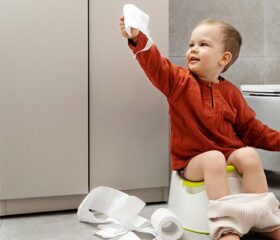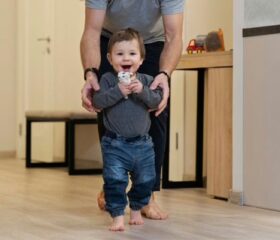What Should You Do if Your Toddler Refuses to Potty Train?
Not every toddler is ready to potty train from the get-go, so don’t be surprised if your kid is a little more stubborn and needs extra time or a gentle nudge.

No amount of potty training reading can prepare you for the unwavering resistance some toddlers show.
This can be a frustrating hurdle, but know that you’re not alone. Read on to learn how to identify potty training resistance, what causes it, and how to deal with it.
What is potty training resistance?
Potty training resistance is when a child seems ready to use the toilet but chooses not to. This usually isn’t a matter of his physical readiness but his mental resistance.
If your child is going through this stage, he might not even agree to try potty training but respond with a resolute “no” (a favorite word among toddlers) each time you ask.
What are the signs of potty training resistance?
The clearest sign your toddler can give you is an outright verbal refusal whenever you bring up potty training. He might also:
- Refuse to sit on the potty or remove his clothes or diapers
- Have emotional outbursts (e.g., crying, getting angry, or withdrawing from you when you mention the potty)
- Have more accidents
To make it worse, some toddlers will go in their diapers instead of the potty on purpose or deliberately hold back their urine or stool. The latter is not only uncomfortable, it may also lead to health issues like constipation. 1
Regressions are also common in potty-trained children
It’s normal for a child who was once potty-trained to experience a regression. This could happen if there’s been a big change in your kid’s routine, like starting a new school or moving house. If it happens, try not to scold your child. Instead, focus on what could be causing his regression.
Why do toddlers resist potty training?
To help your toddler overcome his potty training resistance, you need to understand the reasons behind it. Here are some common culprits:
- Lack of readiness: There’s a chance your toddler simply isn’t emotionally or physically ready, even if he shows some signs of readiness for potty training.
- Need for control: By and large, toddlers like to be in control. Choosing to go in his diaper instead of the potty is one of the few things your toddler has control over, and he may want to hold on to that power.
- Fear of the potty: The bathroom can be a surprisingly scary place for a toddler. The loud flushing sound, the uncertain feeling of sitting on a large toilet, or even the idea of something disappearing down the drain may make your toddler anxious.
- Attention seeking: Sometimes, your toddler may resist potty training just to get a reaction from you, especially if he senses your eagerness. After all, negative attention is still attention.
- Disruption in routine: Major life changes can disrupt your toddler’s sense of security. Whether it’s a new sibling, starting daycare, or moving to a new home, he might resist starting potty training at all in response. As mentioned, it’s also normal for these big life changes to cause your child to regress in his potty training progress. 2
How do you overcome potty training resistance?
Understandably, you might feel frustrated if your toddler refuses to potty train. The good news is that there are many things you can do to help him overcome his resistance.
Try these methods if your toddler won’t cooperate with you:
Re-evaluate your toddler’s readiness
First and foremost, make sure your toddler is truly ready to begin potty training. While most children are ready by 30 months old, your child might need some more time. 3
Look for signs of readiness, such as being able to stay dry for over 2 hours at a time, following simple instructions, and telling you he has a wet or dirty diaper. 4 If your toddler only checks off one or two signs, then it’s a good idea to wait a little longer until he’s more mature.
Make potty training your toddler’s choice
Give your toddler some control over the situation, so he doesn’t feel like you’re forcing him to potty train. For example, you can let your toddler pick out his own big-boy underwear or potty seat.
Instead of telling your child when he has to go potty, let him decide when to go. You might find that he’s more interested in potty training if he feels like it’s on his terms.
Create a positive environment
Make sure your toddler feels comfortable and safe in the bathroom. For starters, pick a potty seat that’s secure and fits him. You can also decorate the bathroom with fun pictures and stickers.
If your toddler is afraid of the toilet, ask him what exactly he’s scared of and try to reassure him. For instance, if he’s afraid of the flushing sound, you could wait until he leaves the bathroom to flush the toilet.
As you encourage your child during the process, don’t show too much excitement or disappointment. Doing so might make him feel pressured. Calm praise and a smile will often do the trick.
Offer incentives
Your toddler may also be more engaged if he finds potty training fun. To make things exciting, you could race him to the potty, read to him when he’s on the potty, and sing a silly song after he goes.
Sometimes, a reward gives your toddler the extra nudge he needs to start potty training. You can offer him small rewards like a sticker or hand stamp each time he goes successfully.
However, you should be careful about relying too much on rewards, as they could conflate the message of why you’re potty training in the first place. 5 Your toddler could be more focused on getting a reward than learning to potty train, and considering how strong-willed kids can be, transitioning him away from these incentives might prove challenging.
Get help from a third-party
As annoying as it can be, toddlers are sometimes more willing to listen to people who aren’t their main caregivers. If that’s the case with your child, ask his grandparent, babysitter, or teacher to encourage him to potty train.
You can also let him watch someone else (e.g., his sibling or cousin) go potty. Seeing other kids doing it might motivate him to give it a try.
Take a break
If your toddler is highly resistant to potty training, the best step may be to take a break. 3 Put the potty away, and don’t mention it for a few weeks. This can get rid of any tension or power struggle that cropped up when you tried to potty train him in the weeks before.
When you reintroduce potty training, help your toddler establish regular potty times and praise him consistently when he does a good job. 6 Be patient with his process; don’t scold or punish him if he has an accident, or else he may regress.
When should you see a doctor about your toddler’s potty training resistance?
In most cases, you can combat potty training resistance with plenty of patience and understanding. However, you should talk to your doctor if your child is over 4 years old and still doesn’t go potty. 3
Since children may hold back pee or poop when they resist potty training, this can cause them pain or discomfort. If you sense your child is uncomfortable, take him to the doctor right away.
Medical conditions that can affect potty training
In rare cases, your child might have an underlying medical condition that makes him refuse to go potty.
For example, if your child is constipated or his bowel movements are painful, he may be resistant to potty training. 7
If you suspect there’s something more to your child’s potty-training resistance, don’t hesitate to call your doctor.
You can also consider tracking how often your child goes and his comfort level in your journal or one of those baby tracker apps so that you have an accurate report for your pediatrician..
Final thoughts
As many parents learn, children don’t always act the way you want them to. This is especially true when it comes to potty training. If your child is going through some hiccups during the potty training process, take a step back to look for the root of his resistance.
Use the right methods to address your toddler’s issues, which could even be as simple as giving him some extra time. Above all, be patient with him; he’ll be ready to potty train before long!
Article Sources
- MedlinePlus. "Constipation in infants and children" Retrieved July 29, 2025.
- American Academy of Pediatrics. "Emotional Issues and Potty Training Problems" Retrieved July 29, 2025.
- MedlinePlus. "Toilet training tips" Retrieved July 29, 2025.
- Bureau of Community and Health Systems Child Care Licensing Division. "Toilet Learning and The Toddler" Retrieved July 29, 2025.
- Horizon Education Centers. "Are Potty Training Rewards Good or Bad?" Retrieved July 29, 2025.
- American Academy of Pediatrics. "Emotional Development: 2 Year Olds" Retrieved July 29, 2025.
- American Academy of Pediatrics. "Potty Training Regression" Retrieved July 29, 2025.






